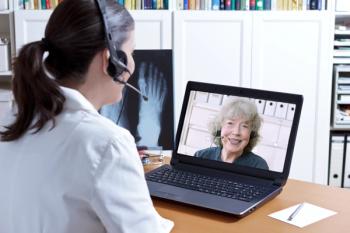
Online Symptom Monitoring with Immediate Advice Improves Symptom Management During Chemo
Researchers indicated that these results support the use of telemedicine as an improved model for patient care during adjuvant chemotherapy.
Online symptom monitoring with immediate advice was found to improve symptom control early during adjuvant chemotherapy, aiding in patient education and self-efficacy, according to a study presented at the 2020 American Society of Clinical Oncology (ASCO) Virtual Scientific Program.
Researchers indicated that these results support the use of telemedicine as an improved model for patient care during adjuvant chemotherapy.
“There is increasing evidence that patients’ self-reporting of symptoms during their care brings benefits. This approach significantly improves clinician awareness of patient’s symptoms, symptom control, and quality of life, use of emergency services, and survival in advanced cancers,” Galina Velikova, PhD, of the University of Leeds, said in a presentation of the data. “A different approach looking at patient education and supporting self-management also acknowledges positive benefits for symptom control.”
In this phase 3 randomized controlled trial, investigators specifically evaluated the impact of eRAPID (electronic patient self-Reporting of Adverse events: Patient Information and advice), an eHealth intervention during chemotherapy, on patient experiences and clinical care. A 1:1 study design was used to compare allocation Usual Care (UC) and eRAPID. Patients filled out their symptoms online weekly for 18 weeks in the eRAPID arm.
Importantly, usual care consists of acute oncology services, where all patients go directly to the acute oncology admissions unit if they have problems, not to the ER; patients are also provided with a 24/7 emergency hotline for advice and all patients receive senior nurse support during their treatment.
The primary outcomes for the study included quality of life (QOL) and symptom control (FACT-PWB Physical Wellbeing Scale) at 18 weeks. Secondary outcomes included process of care (admissions/chemotherapy delivery), patient self-efficacy (Lorig Self-Efficacy Scale), and global QOL.
Patients who were eligible included those who had started chemotherapy for colorectal, breast, and gynecological cancers at Leeds Cancer Centre. Over the course of January 2015 to June 2018, researchers screened 1,484 patients. Overall, 508 of 690 eligible patients (73.6%) consented and were randomized to eRAPID (n = 256) or UC (n = 252).
No statistically significant effect of eRAPID on FACT-PWB score was observed at 18 weeks (difference in means 0.20; 95% CI, -0.81 to 1.20; P = 0.699). However, there was a positive impact at 6 (1.08; 95% CI, 0.12 to 2.05; P = 0.028) and 12 weeks (1.01; 95% CI, 0.05 to 1.98; P = 0.039).
In a responder analysis, a lower proportion of patients using eRAPID had clinically meaningful deterioration at 12 weeks (47.5%) compared to those using UC (56.3%). Pre-planned subgroup analysis also found no effect on metastatic disease, but better FACT-PWB in patients in the non-metastatic/adjuvant group at 6 (1.45; 95% CI, 0.32 to 2.58; P = 0.011) and 12 weeks (1.13; 95% CI, 0.07 to 2.19; P = 0.036).
Additionally, patients using eRAPID reported better self-efficacy (P = 0.007) and QOL EQ5D-VAS at 12 (P = 0.030) and 18 weeks (P = 0.010). There were no differences observed for admissions or chemotherapy delivery though. Despite concerns of an increased clinical workload, only about 1% of 3,000 completion generated an alert to clinicians; the majority (82%) were generating self-management advice.
Post-hoc analyses found high patient adherence was correlated with clinicians’ use of the data, high baseline FACT-PWB, and older age. Even further, patients with high adherence had better FACT-PWB scores at 12 weeks.
“In our study, eRAPID was added to usual care, as at the time we didn’t have enough information on benefits and safety of this approach,” said Velikova. “But going forward, it could be an important component in new models for cancer treatment delivery to reduce hospital attendances while still supporting and monitoring patients.”
“This is pertinent in the current COVID-19 epidemic, and that was recognized by JCO Oncology Practice’s recent editorial,” Velikova continued. “We need good models for monitoring patients, whilst reducing their face-to-face contact.”
Reference:
Velikova G, Absolom K, Warrington L, et al. Phase III randomized controlled trial of eRAPID (electronic patient self-Reporting of Adverse events: Patient Information and advice) – An eHealth intervention during chemotherapy. Presented at: 2020 ASCO Virtual Scientific Program.
Newsletter
Stay up to date on recent advances in the multidisciplinary approach to cancer.




































